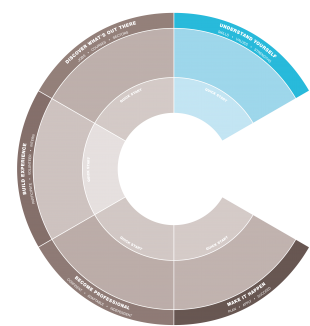By understanding yourself you can gain a better sense of what you might enjoy, what you are good at and begin thinking about the types of jobs/careers that might be a good match for you (N.B. there may be several!) Employers are also interested in your skills, values and strengths, so the better you understand yourself, the better you can articulate these in your applications and at interview.
Getting started: quick wins
The Careers Service website includes some great information to help you get started understanding your skills, values and strengths. The Student Guide has suggestions of 'quick wins' - activities that you can do in a few minutes - to help you start the process.
Engineering-specific skills developed
The Graduate Prospects What can I do with my degree? profiles include an introduction to the skills that typically you’ve developed through studying your engineering discipline(s):
- What can I do with my degree? Chemical engineering
- What can I do with my degree? Civil engineering
- What can I do with my degree? E&E engineering
- What can I do with my degree? Mechanical engineering
If you’re still looking for a bit more guidance try reading the 2-page Higher Education Academy’s Student Employability Profile for Engineering.
You'll notice that these skills can be grouped into 'hard' or 'technical' skills (e.g. performing engineering calculations; using bespoke software; programming) and 'soft' or 'transferable' skills such as teamwork, leadership, problem-solving, presenting; persuading).
- The former you will be developing on your degree course: look at the DRPS and browse the learning outcomes of the courses you have taken to get an idea of what you should have gained.
- Some of the latter skills may come from your degree too (e.g. group work; design projects) but could equally have been developed outside of engineering (e.g. in a bar job) but are sought after by engineering and non-engineering recruiters alike.
Digital skills developed
The JISC Digital Skills Development Tool allows you to reflect on your digital capabilities and to identify current strengths and areas for development.
What skills do you need?
While it is beneficial to take stock and reflect on the skills your degree and extra-curricular activities have/are helping you to develop, it is equally as important to look forward and consider the skills you need in your the job(s) you are considering in your future: what are recruiters expecting of you? Here are a few ways to find out...
- Check out job profiles: Use the Prospects and TARGETJobs profiles to examine the job roles that interest you. There are hundreds of profiles, covering jobs within - and beyond - engineering. Both of the websites' job profiles include a section covering the skills typically needed. (N.B. If you are interested in roles in the Construction sector, TARGETjobs lists these under 'Engineering' while Prospects lists them separately under 'Property & Construction'.
- Browse job vacancies (internships and/or graduate roles): Log onto MyCareerHub to get a sense of what real employers are asking for. In addition to live vacancies, you can use the archive to access thousands of expired vacancies to give you a fuller picture. Learn more about how to search for jobs on MyCareerHub by watching this short video.
- Ask employers: attend presentations and careers fairs in the School, university or beyond. Those notified to the School can be found advertised in the ETO Bulletin emailed out weekly. Further opportunities are listed in the 'Events' tab of MyCareerHub.
Filling the gaps
If you’ve identified skills-gaps you need to fill, or simply wish to further enhance your skills and develop yourself, a great place to start is MyDevelopmentHub, an online portal to help you find activities, events and resources to suit your needs, fit your circumstances and to unleash your potential. In addition, you can develop your:
- Knowledge: Studying in your spare time (even a few hours/week) can be a great way to fill any knowledge gaps and demonstrate genuine interest to a recruiter. The University provides free access to LinkedIn Learning which offers access to over 13,000 courses covering business, creative and digital skills - everything from project management to Python; leadership to Lean 6 Sigma! Other learning opportunities come via MOOCs: massive open-access online courses. These are free (unless you wish to sit an exam), online courses run by institutions across the world (including Edinburgh, Harvard and MIT) and offering everything from bioinformatics to Russian language. Googling "MOOC" will bring up some of the main providers (e.g. Coursera and edEx). Wikipedia has a reasonable list too.
- Digital Skills can be further enhanced with a helpful guide put together by IS of what you can do at each stage of university. Don't worry if you are starting a little late - the guide tells you how long each part takes, so you can dip in/out and catch-up as you wish.
- Experience: find out how you can build experience while at university through volunteering, representing and working. Doing so will also help you build skills.
In more depth: Toolkits
Our Understanding Yourself Toolkit give you the opportunity to think about about, reflect and learn about your skills, values and strengths in more detail. It covers:
- What are you good at? Understanding your skills and strengths
- What interests you? Understanding what activities interest you
- What's important to you? Understand what you're looking for in a job
- Other factors that will influence your career decision making
You can work through the Toolkit at your own pace, either systematically from start to finish or dipping into aspects which you feel are most relevant to you . Find out more about using the Toolkits via this 7-minute 'Top Tips' video.
Access the Toolkit via MyEd > LEARN > Self-enrol Courses > (search for) Careers Service Toolkits



